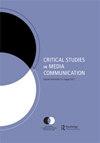It gets better when you fall in Love on the Spectrum
IF 1.5
2区 文学
Q3 COMMUNICATION
引用次数: 0
Abstract
ABSTRACT Love on the Spectrum (2019–) premiered on Netflix in July 2020. The reality television show follows young autistic adults in Australia as they date, fall in love, and get married. I argue Love on the Spectrum (LOTS) ignores the marginalizing forces of ableist structures in favor of telling individual “supercrip” stories of autistic success that are grounded in heteronormative conventions of the romantic comedy genre. Specifically, I suggest LOTS sends a message to the loved ones of autistic people that “It Gets Better” through a classist and heteronormative narrative that suggests the problems of autism—familial dependence and being nonverbal—can be solved through heterosexual love and societal tolerance. LOTS erases queer identities (i.e. asexuality and bisexuality) to normalize neurodiversity and reinforce heteronormativity. The show calls on its presumed neurotypical audience to root for the “right” kind of autists — those who are palatable and place romance before personal interests—while problematically marking as strange and laughable autists who are too far removed from neurotypicality.当你在频谱上坠入爱河时,一切都会变得更好
《频谱之恋》(2019 -)于2020年7月在Netflix首播。这部真人秀节目讲述了澳大利亚年轻的自闭症成年人约会、恋爱和结婚的故事。我认为《频谱上的爱》(LOTS)忽略了残疾主义结构的边缘化力量,而倾向于讲述基于浪漫喜剧类型的异性恋规范惯例的自闭症成功的个人“超级”故事。具体来说,我认为《lot》通过一种阶级主义和异性恋规范的叙事方式,向自闭症患者的亲人传达了一个信息:“一切都会好起来的”,这表明自闭症的问题——家庭依赖和沉默寡言——可以通过异性恋的爱和社会的宽容来解决。lot消除了酷儿身份(即无性恋和双性恋),使神经多样性正常化,并加强了异性恋的规范性。该节目呼吁其假定的神经正常的观众支持“正确”类型的自闭症——那些令人愉快的,把爱情放在个人利益之前的人——而有问题的是,他们被标记为与神经典型相去甚远的奇怪和可笑的自闭症患者。
本文章由计算机程序翻译,如有差异,请以英文原文为准。
求助全文
约1分钟内获得全文
求助全文
来源期刊

Critical Studies in Media Communication
COMMUNICATION-
CiteScore
2.10
自引率
0.00%
发文量
34
期刊介绍:
Critical Studies in Media Communication (CSMC) is a peer-reviewed publication of the National Communication Association. CSMC publishes original scholarship in mediated and mass communication from a cultural studies and/or critical perspective. It particularly welcomes submissions that enrich debates among various critical traditions, methodological and analytical approaches, and theoretical standpoints. CSMC takes an inclusive view of media and welcomes scholarship on topics such as • media audiences • representations • institutions • digital technologies • social media • gaming • professional practices and ethics • production studies • media history • political economy. CSMC publishes scholarship about media audiences, representations, institutions, technologies, and professional practices. It includes work in history, political economy, critical philosophy, race and feminist theorizing, rhetorical and media criticism, and literary theory. It takes an inclusive view of media, including newspapers, magazines and other forms of print, cable, radio, television, film, and new media technologies such as the Internet.
 求助内容:
求助内容: 应助结果提醒方式:
应助结果提醒方式:


